
15 minute read
GARDENING Winter snowdrops
IN SEARCH of SNOWDROPS
The sight of the diminutive snowdrop is always a welcome one as it signals that spring is just around the corner. This year the presence of these little white gems will be especially well- received as the sign of a new season, warmer weather and hopefully an end to lockdown!
Advertisement
Words: Rob Davis. THE BEST LAID PLANS of mice and men gang aft a-gley, said the poet Robert Burns, who will be celebrated at (private) Burn’s Night suppers as Pride goes to press. Also due to be celebrated at this time of year is the snowdrop, that diminutive white flower that heralds the end of winter and the coming of spring.
This year, the flower was also due to herald the end of Covid, and of social distancing, lockdowns and so on, but alas, with this edition written and completed prior to Christmas – complete with a guide to where you could see blankets of snowdrops locally throughout February – a fresh set of measures to curb the virus, including lockdown, has necessitated a hasty rewrite of these pages from the Editor’s dining room table.
In Search of Snowdrops... Happily, we rarely need to do little more than look out of the window of our domestic prison cells to appreciate the snowdrop; it’s prolific and can be seen in our gardens, on verges and in woodland during even the most local of dog walks.
And so, the snowdrop – which will make its appearance as Pride goes to press and remain a feature of our outside spaces at least until mid-March, could still usher in an era when Covid restrictions are lifted, when spring comes along and when life begins to return to normality.
The Basics... One man who knows all about snowdrops of Keith Weed, who, despite his amusingly ironic name, is president of the RHS and thus responsible for championing all of the stuff that should be in your garden, not the stuff that shouldn’t... >>
Main: Snowdrop taken by Fred Cholmeley of Easton Walled Gardens... a great recommendation as a place to see snowdrops, we highly recommend visiting the garden once lockdown is lifted!
“For welcome assurance that the brighter days of spring are on their way, we need look no further than snowdrops,” Keith says.
“They’re surprisingly varied in height, flower size, shape and even colouring. Any garden can accommodate snowdrops; they just need to be planted, freshly lifted, when the foliage is just dying back in late spring.”
“Snowdrops typically flower between January and March, and should be planted from late April into May.”
“Plant them in a partly-shaded position in a moist, but well-drained soil with some leafmould or garden compost incorporated. It’s important that the soil does not dry out in summer, but otherwise they’re fairly hardy and easy to encourage.”
Snowdrop Varieties... “Galanthus nivalis is the familiar naturalised snowdrop of our February woods and gardens. The narrow foliage is grey-green, the edges should touch at the base (not be ‘reflexed’ or overlapping). The flowers have outer petals about 2.5cm (1in) long and the inner petals have a small neat green inverted ‘V’ at the tip. Often thought of as a British native, the variety was probably brought to Britain in the 16th century.”
“‘Atkinsii’ is a very early, vigorous and slightly honey-scented variety with long, slender petals and a green heart-shaped mark at the tips of the inner petals.”
“‘Magnet’ is perhaps the most elegant of all snowdrops, flowering in February and March, and noted for the unusually long stalk which holds the flower away from the stem so it dances in the slightest whisper of breeze.”
“‘Reginae-olgae’ is the best known of the autumn-flowering snowdrops, and is generally similar in appearance to G. nivalis. It may flower in early September, but usually opens in October or sometimes later.”
Propagating Snowdrops... The four main ways to propagate snowdrops are to lift and divide them as the foliage turns yellow in spring; to sow seeds around June; or the rather more involved processes
Snowdrops Facts for Budding Galanthophiles...
n Snowdrops are more formally known as Galanthus, a genus of over 20 herbaceous plants similar in appearance. n Fans of these Amaryllidaceae are known as galanthophiles. n The name translates as ‘milk flower’ and as they’re the first flower to appear in the calendar, they were traditionally a sign of purity and religious faith. n Traditionally snowdrops wouldn’t flower until late February, but since the 1950s, it has been noted that they’re making an earlier appearance in gardens. This has been attributed to global warming. n There are more than 2,500 species of snowdrop, with Galanthus nivalis or the ‘common snowdrop’ the most commonly seen. n Snowdrops tend to prefer well-drained soil in light shade; a woodland habitat is ideal. Late spring is the ideal time to divide and plant snowdrops just as the foliage is dying off. n Snowdrops should be divided up into three or five smaller clumps, and snowdrop bulbs rising to the surface of the soil is a sign they’re keen to be split up! of twin-scaling and chipping – essentially cutting into the bulbs to producing many more in a short space of time.
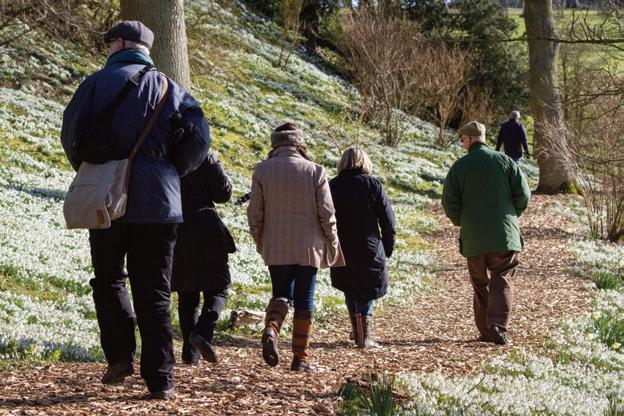
Potential Problems... “Squirrels digging up snowdrops planted as dry bulbs may be a problem,” says Keith. “Sometimes seedlings are also lost through ‘damping off’ which is caused by fungi and results in their collapse.”
In search of snowdrops... At the time of writing, lockdown looks set to put paid to a visit to local snowdrop gardens. However, as soon as restrictions ease – hopefully we’ll still be in spring – we must recommend a visit to Easton Walled Gardens, just off the A1 on the border of Lincolnshire and Rutland.
The 12-acre gardens have been restored by its owners Fred & Ursula Cholmeley, whose spring displays are a particular highlight, along with its sweet peas later in the year (Easton, NG33 5AP. Call 01476 530063, www.visiteaston.co.uk).
Elsewhere in Lincolnshire, Grantham’s 1,300 acre National Trust-owned Belton House (NG32 2LW, 01476 566116) or Gunby Hall (www.nationaltrust.org.uk) also have spectacular displays of snowdrops and other spring flowers to enjoy. n
This Page: Closeup of an Easton Walled Garden snowdrop by Fred Cholmeley.
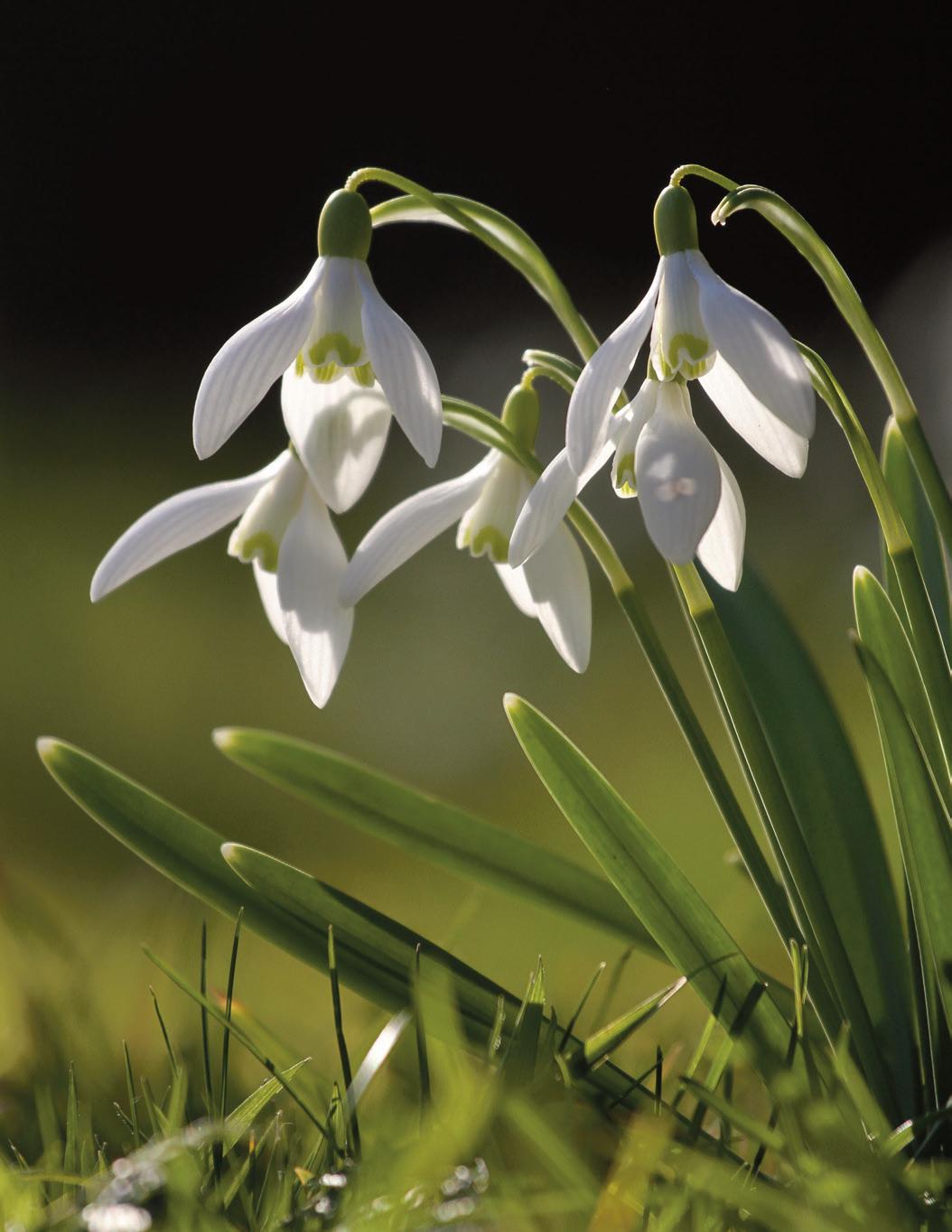


ACCEPTABLE in the 80s

Hard to believe that the era of big music, big shoulder pads and big fashion was 40 years ago, but what was acceptable in the 80s is once again making a return to your wardrobe...

This Page: Desiguel Chunky knit jumper, £94.
Slim midi-dress with Be You typographic print £129.


Desiguel plush floral jumper in shaggy knit £119.
Soft touch slim-knit floral dress, with boho floral print, £84.




Top/Left: Tricot fleece jacket in faux sheepskin, £159. Top/Right: Long tricot coat with friezes in red and black, £194. Bottom/Left: Slim padded jacket, £169. Bottom/Right: Knitted high neck jacket, £139. For local stockists see www.desigual.com.

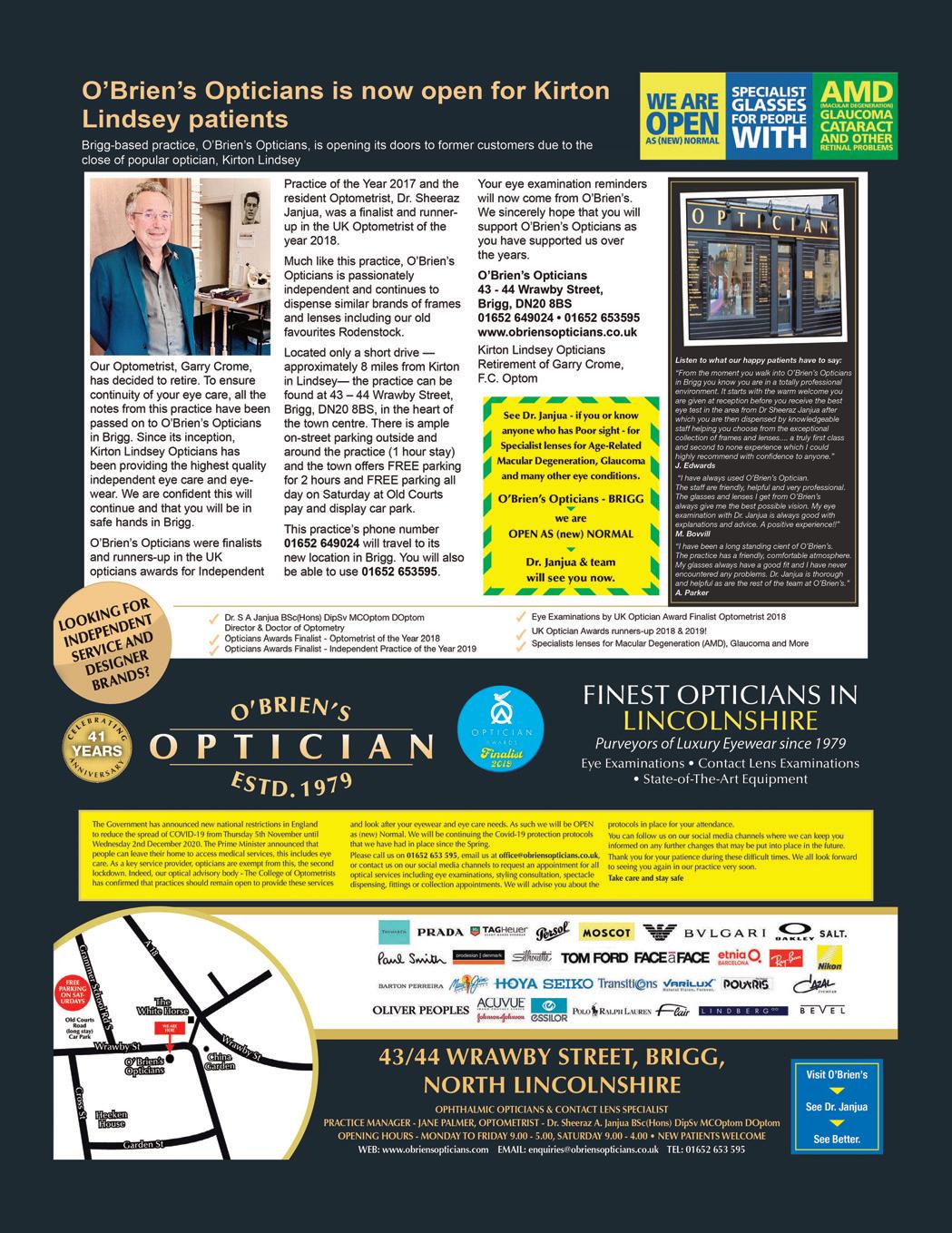
Strike me Pink
ACHIEVE A ROSY AND BEAUTIFUL COMPLEXION THIS MONTH AND TREAT YOURSELF TO A TOUCH OF LUXURY WITH OUR SOFT PINK-THEMED COLLECTION OF WINTER COSMETICS...
1. Be comfortable in your own skin with Dior...


Dreamskin by Dior aims to deliver on a promise of making the most of your own natural radiance. Its Moist & Perfect Cushion acts on the appearance of pores, minor redness and shine for naturally more beautiful skin in every circumstance. The complexion is fresh, matte and luminous with SPF50 protection from harsh winter sun. £65/15g.
5. A welcome way to warm up your winter...
Ascent’s Himalayan Bath Salts are rich in 84 precious minerals designed to enhance the pleasure of a long hot soak in the bath and to re-centre your spirit. A bright and invigorating hit of lavender, geranium rose, and ho leaf (cinnamomum Camphora) uplifts mind, body and soul. With warming cedarwood, it’s a winter treat. £10.20/100g.
2. Frost in translation...
Top tips for your lips from Mac in the form of its special edition lip colours. Shown here is the white pearl ‘Once Bitten, Twice Shy,’ one of five shades available in lustre, pearlescent frost, matte or amplified finishes. The company promises eight hours of wear, £14/3g.

3. On Primer Facie...
Too Faced has created this excellent lightweight primer designed to visibly fill and volumise skin. The company promises a ‘lifted’ look for cheeks and jawline in three days, and greater texture and smoothness, £32/30ml.
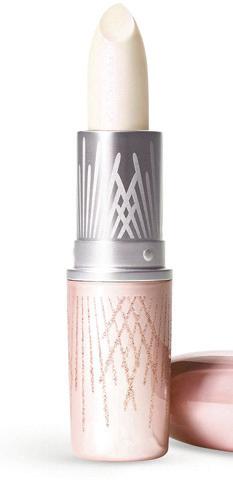
4. Mascara Magic...
Too Faced’s mascara claims to be the number one best-selling premium mascara in the US and now it’s available here, too. Thickens, lengthens and curls whilst delivering a deep, lustrous black colour. £22/8ml.
6. Look scent-sational with cookie cosmetics...

Too Faced has launched a brand new palette of sparkly, glamorous colours. Enchanted Beauty Fox comprises an exclusive palette of 12 eye shadows, plus a highlighted and blush duo palette and its Damn Girl mascara... and did we mention that each product smells like cookies? £28.



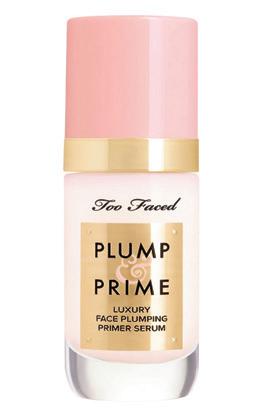
n All our beauty products are available from local independent stockists unless otherwise stated, please note that prices stated are RRP and may vary according to retailer.




HELPING HEROES
Everyone needs support especially during a crisis. Helping to back up the NHS during Covid-19 is the area’s independent healthcare sector. Ramsay Health Care’s Fitzwilliam Hospital has been supporting its state sector colleagues by assisting the local Trust with patients on waiting lists and ensuring everyone receives prompt, high-quality care even during a major pandemic…

Words: Rob Davis.
It’s difficult to find positives during a global pandemic. Economically, socially and emotionally, Covid-19 has impacted us all in a number of ways.
But if this year has proven one thing across the healthcare sector, it’s that independent and state healthcare sectors can work brilliantly together to provide access to prompt, high quality support to patients.
“In ordinary circumstances the Fitzwilliam Hospital provides independent healthcare through self-pay, insurance and NHS pathways,” says the Fitzwilliam’s Hospital Director Carl Cottam.
“During the Covid-19 crisis though, we’ve provided additional capacity to the NHS to ensure that procedures in areas like breast care, urology, gynaecology, orthopaedics - or diagnostic procedures such as endoscopy –that can be performed promptly and in a safe environment.”
“We’ve worked alongside our NHS partners particularly closely this year, and have seen many hundreds of patients come through the door, which has meant we can help people to access a range of services, which also helps efforts to keep the NHS’s waiting lists down.”
“Whilst we’ve been open as usual for our own patients, much of the throughput of our five operating theatres have been work for our local trusts NW Anglia Healthcare Trust. With facilities like our MRI and CT imaging suites we have been able to provide these services to NHS Trusts.
“As part of our commitment to a safe and clean environment both for our patients and our staff, we’ve had to adapt our hospitals, and I’m really proud of the way that everyone has cooperated to ensure our facilities remain exceptionally safe.”
“Patients have been screened upon arrival, systems have been introduced around the hospital, we have created two more entrances, and we’ve been offering ‘virtual’ consultations to reduce the number of people who need to physically enter the building.”
“The feedback has been really great. With around 200 members of staff and a throughput of patients - sometimes for complex procedures - it’s really rewarding that all those coming into the hospital to work or for treatment report that they feel safe and confident with our procedures.”
“We’ve also been providing support for patients via our sister hospital, Boston West, which is a purpose-built day case Hospital which provides services for assessment, diagnosis and treatment of common medical conditions.”
“With a well-equipped modern theatre, we can also undertake a range of surgical procedures and endoscopic investigations at the facility too.”
“It’s also been interesting to note that some patients didn’t realise our facilities can be accessed via the NHS and were not aware of the facilities that we had.”
“We believe that in the course of working even closer with our NHS colleagues than we ordinarily do, we’ve been able to help keep local NHS hospital beds free, introduce more people to our facilities and generally support all those helping to provide excellent healthcare across the region.”
The hospital offers consultant-led care from diagnosis services, to services like physiotherapy plus treatment across a range of disciplines from orthopaedics, general surgical, spinal surgery, ophthalmological and cardiac disciplines, as well as access to pain relief, weight loss and cosmetic procedures.
“We’re really grateful for all the feedback we’ve received and recognise the hard work and dedication of all those in the healthcare profession, both in the state and the independent sectors,” adds Carl Cottam.
Find Out More: Ramsay Healthcare’s network of hospitals include Peterborough’s Fitzwilliam and Boston West. For a no-obligation consultation call 01733 842304 or find out more at www.fitzwilliamhospital.co.uk

It’s not just business. It’s personal.
Tristran Russell is your accountant in the field... literally, sometimes. With a determination to build your business beyond the numbers, he’s one of the faces behind Lincolnshire’s long-established accountancy firms, Dexter & Sharpe... and he’s a part-time dairy farmer, too!
TRISTRAN RUSSELL is your accountant in the field. literally, sometimes. His family still farms land at Mareham Le Fen, and on the odd weekend, when his brother needs a hand Tristran can still be found attempting to wrestle with an impatient heifer at one of the few remaining dairy operations in Lincolnshire.
“It’s a world away from accountancy, but the two are so different that it’s refreshing to help out on the family farm,” he says.
“Even though I’m not a farmer it’s nice to be on a tractor at the weekend, and it serves as quite an important reminder than even though I’m not in the industry, the changing fortunes of farming are still relevant to me, since they have a sort of ripple effect that should matter to the whole community.”
“We’ve clients in lots of different sectors like farming, so understanding what’s going on in the arable and livestock sectors, as well as in the haulage industry, in retail and in hospitality... all helps us to put thought and context into the advice we offer, and to ensure we have a better understanding of our clients’ needs.”
“Our founder company can trace its heritage back to 1883, perhaps even earlier than that, but with the amalgamation of several practices we’ve grown to become a company with over a hundred members of staff and seven offices.”
“Happily though, we haven’t outgrown our remit of building a business beyond the numbers. We’re known for offering a range of services from accountancy, income and corporate tax advice, to business planning and audit services.”
“But what we’re really renowned for is getting to know our clients and providing the trust and continuity that takes the anxiety and stress out of running a business. 2020 was an unprecedented year for businesses in every sector and of every size.” “It presented its own challenges not least in accountancy, with practical problems like furlough payments and the opportunity to apply for grants, but scope for broader advice too like business continuity planning and resilience.”
“As someone close to the farming community, I know, for instance, that the sector has also been effected by average crop yields which has had a knock-on effect on the planting of the arable sector’s spring grain crops.”
“Understanding not just broader problems like Covid and Brexit, but sector-specific problems, like these and being able to form long-term partnerships with our clients allows us to offer advice proactively as well as reactively, and to establish systems which enable them keep on top of things like PAYE and VAT returns, taking the stress out of running at least that element of the business.”
“That’s especially important at this time of year. The end of the tax year shouldn’t give you stress; everything should be under control... and it can be, we can work with you to make sure of it.”
“As well as being a company with a traditional approach to looking after our clients, though, we also pride ourselves in utilising technology to help make business less daunting.”
“We have a wealth of software from Xero and Sage to Quickbooks and Receipt Bank as well as sector-specific packages like Farmplan. These are designed to ensure you stay on top of your business from your smartphone even when you’re manhandling a Holstein into a milking parlour.”
“We work with everyone from sole traders and new businesses to companies with turnover figures in the hundreds of millions, and yet our approach is the same; provide good advice, continuity of contact and continue to justify the great reputation we have in the county.” n
Find Out More: Dexter & Sharpe has offices in Horncastle, Boston, Bourne, Lincoln, Louth, Skegness and Spilsby. The company provides a range of services from accountancy and payroll to tax and wealth management. For more information call 01507 526071 or see www.dextersharpe.co.uk.











